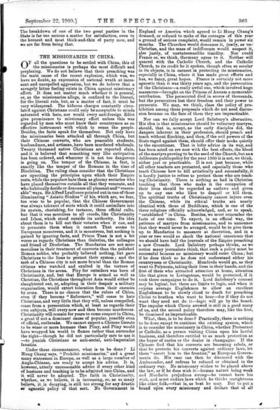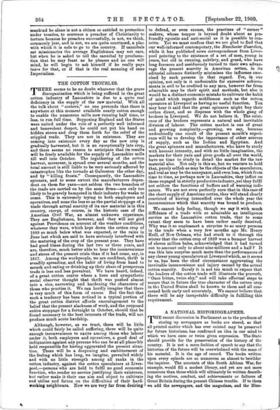THE MISSIONARIES IN CHINA.
OF all the questions to be settled with China, this of the missionaries is perhaps the most difficult and perplexing. We do not believe that their preaching was the main cause of the recent explosion, which wae, we have no doubt, an expression of national wrath at inces- sant and unrepelled aggression, but we do believe that a savagely bitter feeling exists in China against missionary effort. It does not matter much whether it is general, or, as the missionaries allege, is confined to the literati, for the literati rule, but, as a matter of fact, it must be very widespread. The hideous charges constantly circu- lated against Christians could only be acceptable to minds saturated with hate, nor would every anti-foreign Edict give prominence to missionary effort unless this was regarded by men who must know their countrymen as an effective instrument with which to rouse the people. Besides, the facts speak for themselves. Not only have the missionaries been attacked all through China, but their Chinese converts, who are peaceable students, husbandmen, and artisans, have been murdered wholesale. Twenty thousand native Christians are reported slain, and it is believed that something very like extirpation has been ordered, and wherever it is not too dangerous is going on. The temper of the Chinese, in fact, is exactly like the temper of the Romans in the time of Diocletian. The ruling class consider that the Christians are upsetting the principles upon which their Empire rests, while the populace hate them as gloomy sectaries who have placed themselves outside all that they venerate, and who habitually deride or denounce all pleasant and" reason- able" ways. Sir Alfred Lyall once pointed out in one of those illuminating "Asiatic Studies" of his, which are, we fear, too wise to be popular, that the Chinese Government was always tolerant of sects which it could assimilate into its system, cherishing, for instance, three official cults, but that it was merciless to all creeds, like Christianity and Islam, which stood outside its authority. Its idea about them is to kill out their votaries when it can, and to persecute them when it cannot. That seems to Europeans monstrous, and it is monstrous, but nothing is gained by ignoring facts, and Prince Than is not a bit worse as regards Christians than G-alerius, the colleague and friend of Diocletian. The Mandarins are not more merciless in their treatment of converts than the polished Roman nobles, who probably believed nothing, but gave Christians to the lions to protect their system ; and the mob of a Chinese city is not more brutal than the Roman citizens who watched and exulted in the torture of Christians in the arena. Pity for outsiders was born of Christianity, and, but that Europe is armed as well as Christian, the Christians throughout Asia would either be slaughtered out, or, adopting in their despair a military organisation, would extort toleration from their enemies by arms. There is no chance that the rulers of China, even if they become "Reformers," will cease to hate Christians, and very little that they will, unless compelled, cease from a persecution which, at least as regards their own subjects, will every now and then become murderous. Christianity will remain for years to come suspect in China, a great if not a dominant cause of popular, possibly even of official, outbreaks. We cannot expect a Chinese literate to be wiser or more humane than Pliny, and Pliny would have wrapped his world in flames rather than surrender the right—though he did not particularly care to use it —to punish Christians as anti-social, anti-Imperialist fanatics.
Under these circumstances, what is to be done ? Li Hung Chang says, "Prohibit missionaries," and a great many statesmen in Europe, as well as a large number of Anglo-Chinese, are ready to accept his advice. It is, however, utterly unreasonable advice if every other kind of business and teaching is to be admitted into China, and it will never be adopted. The faith in Christianity, whether, as we believe, it is increasing, or, as so many believe, it is decaying, is still too strong for any drastic or agnostic policy of that sort. No Government in England or America which agreed to Li Hung Chang's demand, or refused to make of the outrages of this year a ground of serious complaint, would remain in power six months. The Churches would denounce it, justly, as un- Christian, and the mass of indifferents would suspect it, also justly, of unstatesmanlike timidity. Nor could France or, we think, Germany agree to it. Neither will quarrel with the Catholic Church, and the Catholic Church, to its credit be it spoken, though often so secular in its objects, is in earnest in protecting its missionaries, especially in China, where it has made great efforts and has, we fancy, great hopes. France is certainly not more agnostic than it was thirty years ago, and the persecution of the Christians—a really awful one, which involved huge massacres—brought on the Princes of A.nnam a memorable retribution. The persecuted died in scores of thousands, but the persecutors lost their freedom and their power to persecute. We may, we think, class the policy of pro. hibition among those proposals which do not need discus- sion because on the face of them they are impracticable.
Nor can we fully accept Lord Salisbury's alternative. His idea is that missionaries should be voluntary martyrs, should, that is, accept, as the early disciples did, the dangers inherent in their profession, should preach and teach without flinching, and then, if the evil powers of the State raged against them, should offer their necks quietly to the executioner. That is lofty advice in its way, and has been acted on ere now with the best effects, the blood of the martyrs proving to be the seed of the Church, but as a deliberate public policy for the year 1900 it is not, we think, either just or practicable. It is not just because, while all other teachers are protected, and especially those who teach Chinese how to kill artistically and successfully, it is hardly justice to refuse to protect those who are teach- ing Christianity. There is nothing so bad in Christian teaching that those who make it the occupation of their lives should be regarded as outlaws and given up to any one who likes to despoil or kill them. The spiritual truths of Christianity cannot injure even the Chinese, while its ethical truths are nearly identical with those of Buddhism, which is one of the three religions officially acknowledged, and, so to speak, " established" in China. Besides, we must remember the facts of our time. To expect, in an official way, the patience of martyrs from missionaries, and to announce tbat they would never be avenged, would be to give them up to Mandarins to massacre at discretion, and in a year or two would so shock the national conscience that we should have half the journals of the Empire preaching a new Crusade. Lord Salisbury perhaps thinks, as we notice many journalists think, that such a policy must be successful because no missionary would enter China ; but if he does think so he does not uuderstand either his countrymen or Christianity. Hundreds would go, as they went to Polynesia, taking their lives in their hands, and the first of them who attracted attention at home, attention like that given to Livingstone, would be protected, if it took three campaigns to do it. Lard. Salisbury's counsel may be logical, but there are limits to logic, and when it enjoins average Englishmen to allow an excellent Englishman to be slowly sliced to death for preaching Christ to heathen who want to hear—for if they do not want they need not do it—logic will go by the board. The impulse which Clovis avowed is still in a good many of us, and the second policy therefore may, like the first, be dismissed as impracticable.
What, then, is to be done ? Practically, there is nothing to be done except to continue the existing system, which is to consider the missionary in China, whether Protestant or Catholic, as a person visiting China upon his lawful business, and therefore entitled to as much protection as the buyer of curios or the dealer in champagne. If the Chinese find that his converts are becoming rebels, or that he protects his converts against ordinary laws, let them escort him to the frontier," as European Govern- ments do. His case can then be discussed with the Ambassador, and redress be refused or obtained in the ordinary way. No missionary wishes to be placed above the law, or if he does wish it—human nature being weak and Mandarin prejudices strong—he cannot have his wish, and must endure laws which he thinks unrighteous like other folk,—that is, as best he may. But to put a brand upon every missionary and declare that of all mankind he alone is not a citizen or entitled to protection under treaties, to sentence a preacher of Christianity to torture because he preaches successfully, is not, we think, commonly just, and is not, we are quite convinced, a plan with which it is safe to go to the country. If cannibals eat missionaries the average Englishman may not care, but when he is asked to tell the cannibal by proclama- tion that he may feast as he pleases and no one will mind, he will begin to ask himself if he really pays taxes for that, or if that is the real meaning of sane Imperialism.







































 Previous page
Previous page